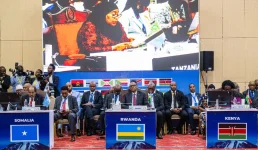A landmark joint summit between the East African Community and Southern African Development Community in Dar es Salaam, Tanzania, has endorsed a peaceful resolution of the eastern DR Congo conflict through the Luanda and Nairobi peace processes. The February 8 meeting called for implementing a previously approved plan to neutralize FDLR, a terrorist militia in DR Congo established by perpetrators of Rwanda's 1994 Genocide against the Tutsi.
At the summit, Rwandan President Paul Kagame emphasized that DR Congo cannot silence Rwanda regarding security threats against his country. He noted Rwanda's repeated attempts to engage DR Congo's leadership on these issues have been unsuccessful. Kagame urged meaningful action, describing the situation as an ethnic war with deep roots involving the denial of rights and attacks on Rwanda.
The summit marked a significant step by merging the Luanda and Nairobi peace processes. Leaders directed military chiefs from both regions to meet within five days to guide immediate ceasefire measures. They also called for direct negotiations with all parties, including the M23 rebel group.
Rwanda maintains defensive measures along its Congo border due to ongoing threats from the Congolese army and its allies. Recent attacks by FARDC on Rwanda's Rubavu District killed 16 civilians and injured over 100 others. Foreign Minister Olivier Nduhungirehe criticized the international community's silence regarding these civilian casualties.
The current conflict involves a complex coalition of forces. The Congolese army fights alongside FDLR, Burundian troops, local militia groups called Wazalendo, and South African-led SADC forces against M23 rebels. M23 recently joined the Alliance Fleuve Congo, advocating for human rights and addressing the root causes of conflict in DR Congo.
AFC/M23 captured Goma, North Kivu's capital, on January 27 after the expiration of their surrender ultimatum to the Congolese army coalition. The rebels established new administrative structures and initiated plans for displaced people to return home. They recently appointed new leadership for North Kivu Province and expanded operations into South Kivu.
Tanzanian President Hassan stressed the urgency of addressing regional insecurity. EAC Chairperson William Ruto called for international support, acknowledging the conflict's complex historical, economic, and political dimensions. The EAC's regional force, deployed in November 2022, maintained peace until October 2023, when renewed fighting reversed earlier progress. The force withdrew in December 2023 after DR Congo's criticism and preference for SADC troops.
The situation reflects deeper regional tensions dating before 1994, when defeated genocide perpetrators fled to eastern DR Congo, establishing bases that continue to destabilize the region.
At the summit, Rwandan President Paul Kagame emphasized that DR Congo cannot silence Rwanda regarding security threats against his country. He noted Rwanda's repeated attempts to engage DR Congo's leadership on these issues have been unsuccessful. Kagame urged meaningful action, describing the situation as an ethnic war with deep roots involving the denial of rights and attacks on Rwanda.
The summit marked a significant step by merging the Luanda and Nairobi peace processes. Leaders directed military chiefs from both regions to meet within five days to guide immediate ceasefire measures. They also called for direct negotiations with all parties, including the M23 rebel group.
Rwanda maintains defensive measures along its Congo border due to ongoing threats from the Congolese army and its allies. Recent attacks by FARDC on Rwanda's Rubavu District killed 16 civilians and injured over 100 others. Foreign Minister Olivier Nduhungirehe criticized the international community's silence regarding these civilian casualties.
The current conflict involves a complex coalition of forces. The Congolese army fights alongside FDLR, Burundian troops, local militia groups called Wazalendo, and South African-led SADC forces against M23 rebels. M23 recently joined the Alliance Fleuve Congo, advocating for human rights and addressing the root causes of conflict in DR Congo.
AFC/M23 captured Goma, North Kivu's capital, on January 27 after the expiration of their surrender ultimatum to the Congolese army coalition. The rebels established new administrative structures and initiated plans for displaced people to return home. They recently appointed new leadership for North Kivu Province and expanded operations into South Kivu.
Tanzanian President Hassan stressed the urgency of addressing regional insecurity. EAC Chairperson William Ruto called for international support, acknowledging the conflict's complex historical, economic, and political dimensions. The EAC's regional force, deployed in November 2022, maintained peace until October 2023, when renewed fighting reversed earlier progress. The force withdrew in December 2023 after DR Congo's criticism and preference for SADC troops.
The situation reflects deeper regional tensions dating before 1994, when defeated genocide perpetrators fled to eastern DR Congo, establishing bases that continue to destabilize the region.












